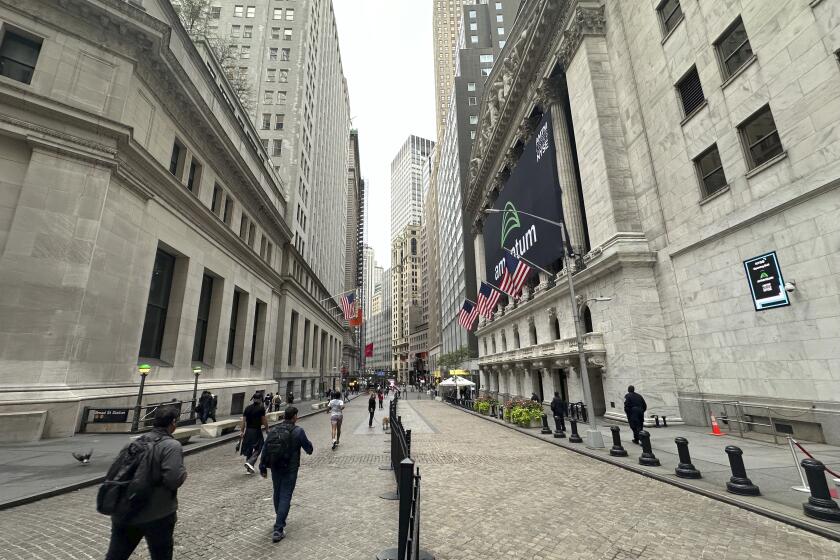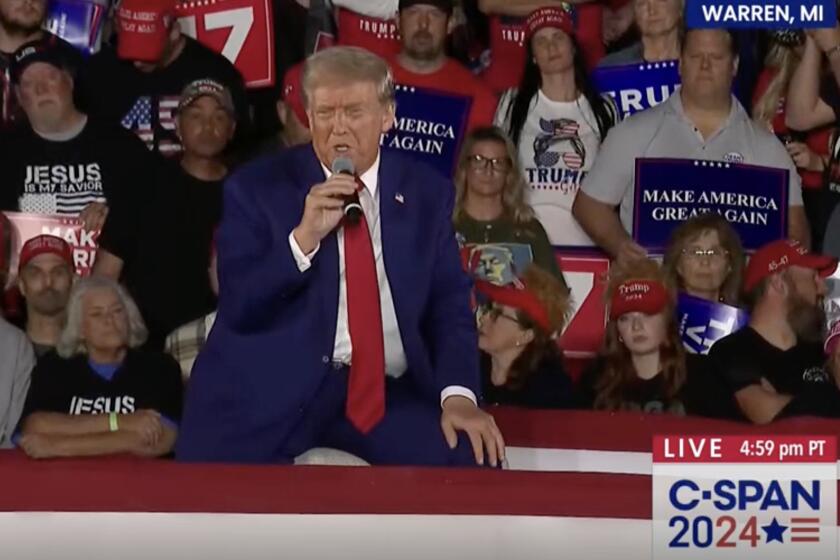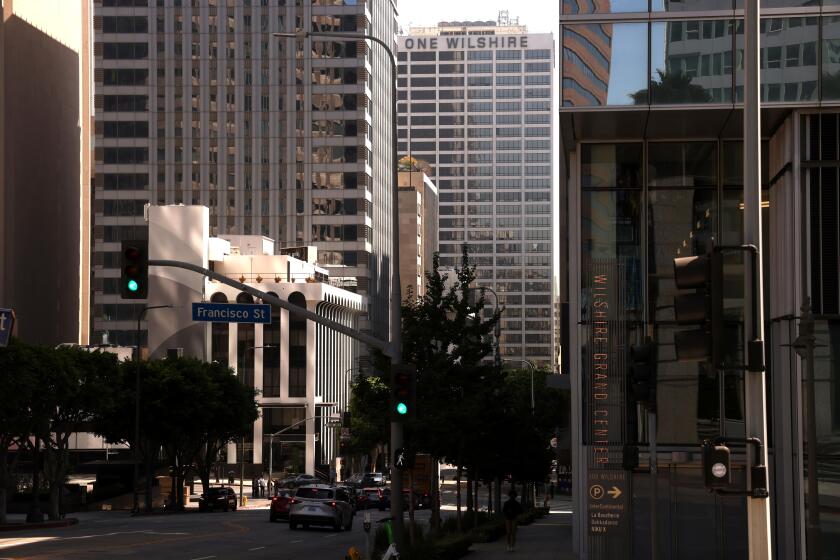Indonesian Banks Begin Sprouting Up Across California : Finance: They hope to cash in on the growing trade with the United States. Deregulation at home was the catalyst that precipitated the expansion here.
Indonesia’s banking industry was dominated by five state-owned institutions when the nation’s government deregulated its financial sector in October, 1988--opening the door of opportunity to aspiring private bankers.
Since then, private-sector banks have begun to proliferate in Indonesian cities such as Jakarta as well as across the Pacific in Los Angeles.
With small staffs and big dreams, the increasing number of Indonesian banks settling in Southern California hope to cash in on burgeoning trade between the United States and Indonesia. They have been coming primarily to engage in commercial lending--providing loans and letters of credit to exporters and importers.
Although Indonesia has only recently begun to make a splash in the world economy--and its banking sector is relatively young compared to counterparts in Western nations and Japan--the combined asset value of Indonesian banks operating in California ranks 10th among all nations. Indonesian banks have more combined assets in California than financial institutions from Britain, Israel, Spain, Singapore and Switzerland.
Those statistics are remarkable considering that there were no Indonesian-owned banks in California in 1983. There are now five banks in California controlled by Indonesians.
The latest is Bank Bali, one of Indonesia’s leading private banks. It established an American presence by opening an office in Los Angeles earlier this month. The others are P. T. Bank Niaga, Lippo Bank, United Pacific Bank and Bank Dagang Negara, an institution owned by the Indonesian government.
Bank Bali, Bank Niaga and Bank Dagang Negara are agencies--not state-chartered banks. That means that they can make loans and provide many other banking services, but they cannot accept savings deposits from citizens or permanent residents of the United States.
On the other hand, Lippo Bank and United Pacific Bank are state-chartered institutions purchased by Indonesians in recent years.
In addition, two more Indonesian financial institutions--Bank Central Asia and Bank Dagang Nasional Indonesia--have asked the state’s banking department for permission to set up operations.
Indonesian banks have been coming to California in quest of trade-related business involving their own nationals, said Hendra Firmansjah, general manager of the Bank Bali operation in Los Angeles. Bank Bali has a staff of four, but Firmansjah said it will grow as it finds Indonesians and Americans needing cash or connections for trade deals.
“We have many potential customers in the United States, and we plan to get our share of that business,” he said.
Indeed, Indonesian exports to the United States have been rising steadily in recent years, as have American exports to Indonesia. Besides oil--a major Indonesian export--exports to the United States include garments, furniture, handicraft items and food such as shrimp.
American exports to Indonesia include factory machinery, computers, telecommunications material, airplane parts and other transportation equipment. Indonesians, who have relied heavily on the Japanese for many manufactured goods, are particularly interested in American products because they are less expensive.
“Lately, the dollar has lost value compared to the yen--and that makes American products cheaper and more desirable,” Firmansjah explained.
Trade analysts say this relationship is likely to grow because Indonesia needs more capital goods as it attempts to build its manufacturing sector and infrastructure.
“As the (Indonesian) economy develops, the trade relationship will grow and there will be more and more business for Indonesian banks,” said Milan Brahmbhatt, director of Asian services for DRI-McGraw Hill, an economic research firm based in Lexington, Mass.
In fact, the Indonesian government deregulated its banking industry--allowing private and foreign banks to operate more freely within the nation--partly out of a desire to foster the banking capacity needed to finance the country’s development needs, Brahmbhatt said.
In the 30 months following Indonesia’s landmark banking deregulation in 1988, 63 private banks have opened there, bringing the total to 174. Bank branches more than doubled to 4,500, while 18 foreign joint-venture banks were licensed.
However, some headaches have resulted from this banking free-for-all. The pangs began in mid-1990 when Bank Duta, one of the five largest private banks, disclosed that it had lost $419 million--mostly in foreign exchange speculation. The Indonesian government is probing allegations that Bank Duta falsified monthly reports submitted to the central bank.
Supervisory standards of Indonesian regulators have failed to keep pace with industry growth, according to analysts. They say Indonesian regulators are overwhelmed with work and are unable to adequately enforce reporting and financial requirements.
More enforcement is needed because the rapid expansion has left the country’s banking sector with a critical shortage of expert professionals. Indonesian banks have been expanding their training programs, raiding each other’s experienced staff and even hiring away managers from Western banks.
Some of this raiding has been taking place in California. For example, Lippo Bank last January hired away Jim Alexander, head of Santa Rosa, Calif.-based Sonoma National Bank, making him chief executive. Lippo Bank, formerly known as the Bank of Trade, was acquired by an Indonesian family in 1984. The Los Angeles-based bank has branches in San Jose and Westminster.
On the trade front, Lippo Bank has been primarily engaged in assisting the shipment of goods from Indonesia to the United States, Alexander said. He said the bank is trying to drum up business from companies that want to export technology to Indonesia--for example, factory machinery, food processing equipment and telecommunications material.
“Indonesia needs more capital, and one of the best ways of obtaining it is to stimulate trade with the United States,” Alexander said.
In effect, Lippo Bank hopes to become more competitive with Bank Dagang Negara, the government-owned institution that has had a presence in Los Angeles since 1985. Bank Bali also hopes to challenge Dagang Negara.
Dagang Negara’s California operations have been very profitable in recent years. Earnings rose to $1.5 million in 1990 from about $1 million in 1989, said Gutomo Wasito, the bank’s Los Angeles-based general manager. The company has earnings of nearly $700,000 in 1991, he said. Its staff has grown to 16 from eight the past three years.
Wasito, however, welcomes new challenges.
“They (competitors) will have customers and we’ll have customers,” he said. “The market is wide enough--and it’s growing.”
U.S.-Indonesian Trade More Indonesian banks are setting up shop in Los Angeles seeking opportunities to finance growing trade between the United States and Indonesia. The following statistics reflect that growing trade (all figures in billions of dollars):
Value of Indonesian exports to U.S.
1988 1989 1990 3.14 3.48 3.72
Value of American exports to Indonesia
1988 1989 1990 1.73 2.22 2.50
Source: DRI-McGraw Hill
Foreign-Owned Financial Institutions in State
Number of Approximate value of institutions combined assets Japan 31 $104.4 billion France 7 $3.8 billion Italy 7 $3.3 billion S. Korea 9 $2.6 billion Canada 8 $2.0 billion Mexico 5 $1.9 billion Germany 5 $1.0 billion Taiwan 4 $884.9 million Hong Kong 4 $803.6 million Indonesia 5 $777.1 million
Source: California State Banking Department
More to Read
Inside the business of entertainment
The Wide Shot brings you news, analysis and insights on everything from streaming wars to production — and what it all means for the future.
You may occasionally receive promotional content from the Los Angeles Times.








